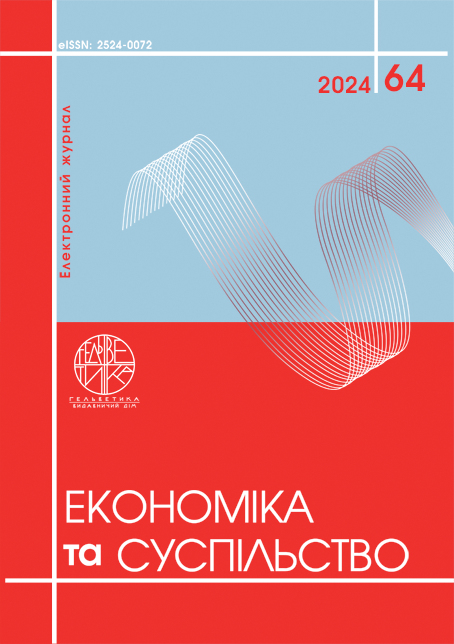EVALUATING THE EFFECTIVENESS OF BUSINESS PROCESS MANAGEMENT SYSTEMS BASED ON A REFLECTIVE APPROACH: A THEORETICAL AND METHODOLOGICAL PERSPECTIVE
Abstract
The article investigates the application of a reflexive approach to enhance business process management effectiveness amidst contemporary challenges. The primary objective is to develop a methodology for assessing the effectiveness of business process management systems by integrating a reflexive approach, which aims to improve enterprise adaptability and resilience in crisis conditions. The research methodology encompasses a comprehensive review of scientific literature, comparison of existing methodologies, and empirical research involving surveys, interviews, and document analysis. The study reveals that the reflexive approach significantly enhances decision-making quality, accelerates business process adaptation, fosters the integration of new practices, and improves team collaboration. A detailed methodology for evaluating the effectiveness of business process management systems based on the reflexive approach has been established. This includes proposed criteria and indicators that facilitate a thorough analysis of managerial changes. The practical implications of this study are considerable, providing actionable recommendations for incorporating the reflexive approach into business processes. These recommendations are designed to aid enterprises in adapting to crisis conditions and enhancing their resilience and competitiveness. Additionally, the article suggests avenues for further research, particularly focusing on refining the integration of the reflexive approach with digital tools. This aspect is increasingly relevant given the current economic and social upheavals, where digital transformation is critical for maintaining competitive advantage. Overall, the developed criteria and indicators offer a robust framework for evaluating the effectiveness of business process management systems, providing valuable insights into the impact of reflexive practices on organizational performance. The study emphasizes the need for a comprehensive approach to managing business processes, taking into account both traditional and innovative methods to achieve optimal results in today’s volatile environment.
References
Dewey J. How We Think. Middle Works. 1910. Vol. 6. Р. 179.
Harrington H. J., Esseling K., Nimwegen V. Business Process Improvement Workbook: Documentation, Analysis, Design, and Management of Business Process Improvement. McGraw-Hill Education, 1997. 314 p.
Brocke V. J., Sinnl T. Culture in business process management: a literature review. Business Process Management Journal. 2011. Vol. 17, № 2. Р. 357–378.
Hammer M., Vom Brocke J., Rosemann M. What is Business Process Management?. Handbook on Business Process Management. Heidelberg : Springer. 2010. Р. 3-16.
Теребух А., Русин-Гриник Р., Підвальний М. Принципи розвитку системи управління бізнес-процесами на основі рефлексивного підходу. Економіка та суспільство, 2023. Вип.49. DOI: https://doi.org/10.32782/2524-0072/2023-49-70.
Уманець Т. В., Клєвцєвич Н. А. Фінансові інструменти забезпечення цифрової адаптації бізнес-процесів реального сектора економіки Бізнес Інформ. 2023. № 11. С. 45-54. DOI: https://doi.org/10.32983/2222-4459-2023-11-45-54.
Шкурат М. Є., Узбек Г. Р. Сучасні методи підвищення ефективності бізнес-процесів компаній в епоху цифрової трансформації. Бізнес Інформ. 2024. №5. C. 136–145. DOI: https://doi.org/10.32983/2222-4459-2024-5-136-145.
Іванова В. Управління бізнес-процесами: людський потенціал і цифрові навички. Mechanism of an Economic Regulation, 2021. Вип. 1 (91). С. 41-54. DOI: https://doi.org/10.21272/mer.2021.91.04.
Демиденко В. В. Управління бізнес-процесами як складова процесного підходу до управління підприємством. Ефективна економіка. 2015. № 11. С. 98-107.
Dewey, J. (1910). How We Think. Middle Works. Vol. 6. Р. 179.
Harrington, H. J., Esseling, K., & Nimwegen, V. (1997). Business Process Improvement Workbook: Documentation, Analysis, Design, and Management of Business Process Improvement. McGraw-Hill Education. 314 p.
Brocke, V. J., & Sinnl, T. (2011) Culture in business process management: a literature review. Business Process Management Journal. Vol. 17(2). Р. 357–378.
Hammer, M. Vom Brocke, J., & Rosemann, M. (2010). What is Business Process Management? Handbook on Business Process Management. Heidelberg : Springer. Р. 3–16.
Terebukh, A., Rusyn-Hrynyk, R., & Pidvalnyi, M. (2023). Pryntsypy rozvytku systemy upravlinnia biznes-protsesamy na osnovi reflexyvnoho pidkhodu [Principles of business process management system development based on a reflective approach]. Economy and Society, (49). DOI: https://doi.org/10.32782/2524-0072/2023-49-70 (in Ukrainian).
Umanets, T. V., & Klievtsievych, N. A. Finansovi instrumenty zabezpechennia tsyfrovoi adaptatsii biznes-protsesiv realnoho sektora ekonomiky [The Financial Instruments for Ensuring Digital Adaptation of Business Processes of the Real Sector of the Economy]. Business Inform, 2023. № 11. P. 45-54. DOI: https://doi.org/10.32983/2222-4459-2023-11-45-54 (in Ukrainian).
Shkurat, M. Ye., & Uzbek, H. R. (2024). Suchasni metody pidvyshchennia efektyvnosti biznes-protsesiv kompaniy v epokhu tsyfrovoi transformatsii [Modern Methods of Increasing the Efficiency of Business Processes of Companies in the Era of Digital Transformation]. Business Inform 5. P. 136–145. DOI: https://doi.org/10.32983/2222-4459-2024-5-136-145 (in Ukrainian).
Ivanova, V. (2021). Upravlinnia biznes-protsesamy: liudskyi potentsial i tsyfrovi navychky [Business Process Management: Human Potential and Digital Skills]. Mechanism of an Economic Regulation, (1 (91), 41-54. https://doi.org/10.21272/mer.2021.91.04 (in Ukrainian).
Demydenko, V. V. (2015). Upravlinnia biznes-protsesamy yak skladova protsesnoho pidkhodu do upravlinnia pidpryiemstvom [Business process management as a component of the process approach to enterprise management]. Efficient economy, 11. P. 98–107 (in Ukrainian).

This work is licensed under a Creative Commons Attribution 4.0 International License.


